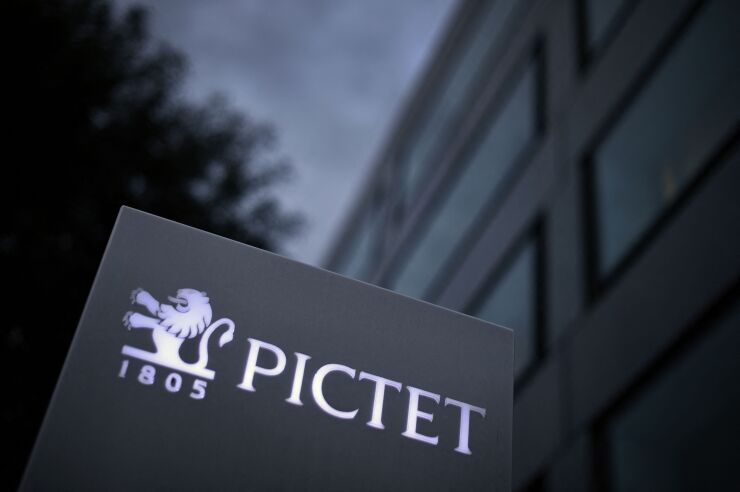Banque Pictet & Cie SA, the Swiss private bank and asset manager, agreed to pay $123 million to resolve a U.S. investigation into how it helped Americans hide more than $5.6 billion in secret bank accounts.
Federal prosecutors charged Pictet with conspiring to help taxpayers use 1,637 accounts to conceal assets and income from the Internal Revenue Service between 2008 and 2014. The bank's U.S. clients evaded $50.6 million in taxes over that period.
The U.S. said it will drop the case after three years if the bank agrees to certain conditions, including protecting against future tax evasion. Pictet will pay a $39 million criminal fine, forfeit $52.1 million and pay $31.8 million in restitution to the U.S.

The Pictet accord comes after the U.S. wound down criminal investigations that once involved more than a dozen Swiss banks. The
"As it has admitted today, Banque Pictet knowingly conspired to conceal from the IRS the income generated by accounts which held more than $5.6 billion," Damian Williams, the U.S. Attorney for the Southern District of New York, said later in a
"Pictet is pleased to have resolved this matter and will continue to take steps to ensure its clients meet their tax obligations," the bank said in a statement.
Swiss banks
The Swiss bank crackdown began when UBS Group AG avoided prosecution in 2009 by admitting it helped thousands of Americans evade taxes and paying $780 million. Credit Suisse Group pleaded guilty in 2014, paying $2.6 billion, and Julius Baer Group Ltd. paid $547 million to avoid U.S. prosecution. Each
In 2016, the Justice Department ended a disclosure program in which 80 Swiss banks paid $1.36 billion in penalties for helping Americans evade taxes. Those banks, which included BSI SA, Union Bancaire Privee and Bank Lombard Odier & Co., held about $50 billion in U.S. assets in 35,096 accounts from 2008 to 2013, according to data compiled by Bloomberg.
Pictet admitted helping its clients use "coded accounts, foreign trusts and entities, nominee beneficiaries and other deceits to conceal their income and assets abroad," Stuart M. Goldberg, acting deputy assistant attorney general, said in a statement.
In court documents, Pictet said it knew it broke U.S. law.
"The Pictet Group opened and maintained undeclared accounts for U.S. taxpayer-clients and knew that, by doing so, the Pictet Group was helping these U.S. taxpayer-clients violate their legal duties," according to a statement of facts filed as part of its deferred-prosecution agreement.
Common tricks
Some of its tricks were common for Swiss banks. Pictet admitted helping 108 U.S. clients with offshore entities; letting clients make structured withdrawals by check in amounts less than $10,000 to avoid detection; processing sham "exits" by U.S. taxpayers but helping them continue to control the assets secretly.
One client with $130 million in undeclared accounts avoided a U.S. requirement to declare securities by transferring assets to a Singapore bank, which returned them to Pictet in the name of a Swiss insurance company, court records show.
But Pictet voluntarily disclosed the accounts to the U.S. in 2014 and fired the principal private banker involved. In cooperating with the U.S., it set up interviews with more than a dozen current and former employees and made more than 20 presentations to the Justice Department.
The case is U.S. v. Pictet, 23-cr-631, U.S. District Court, Southern District of New York (Manhattan).





